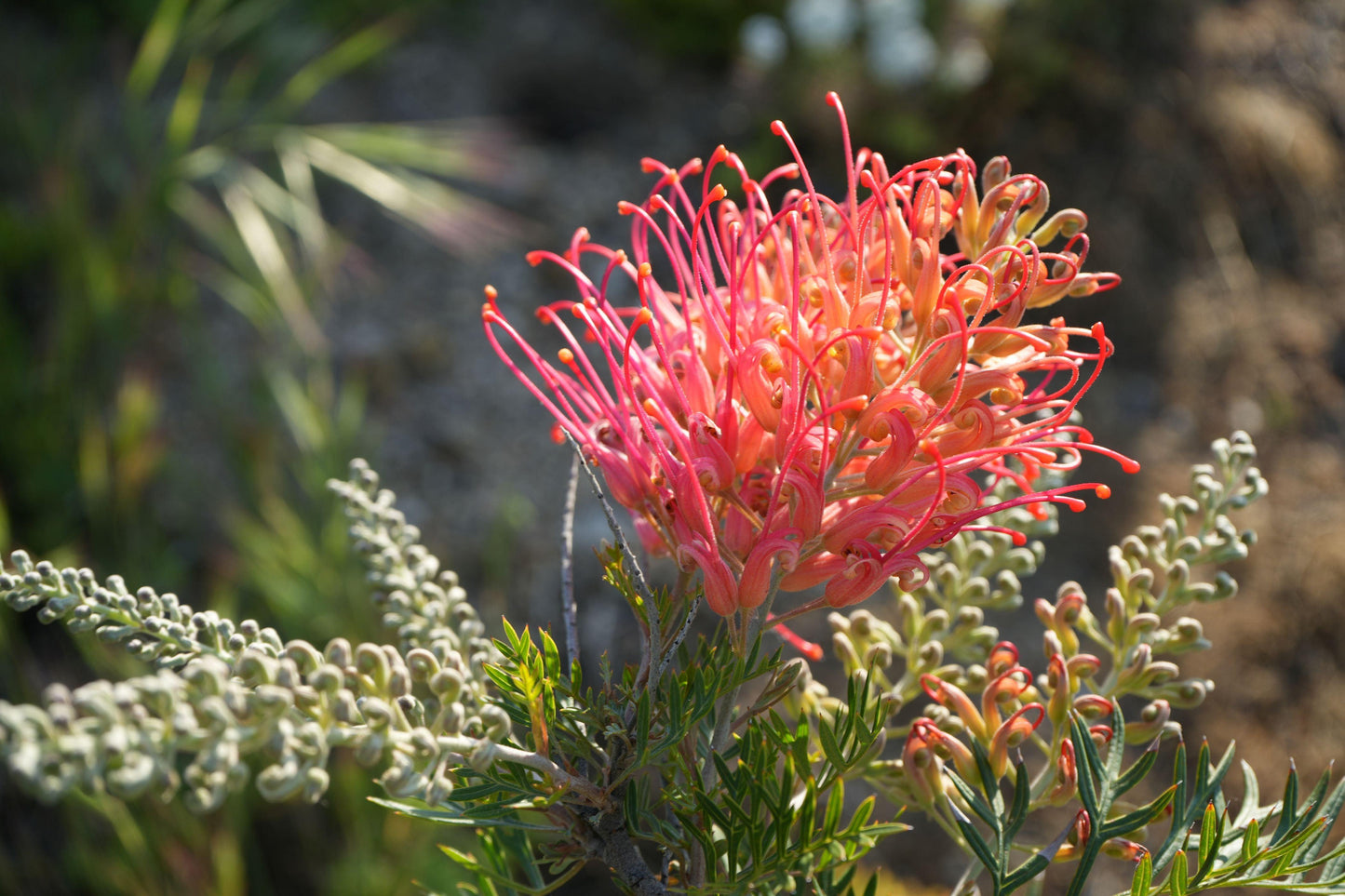Bonte Farm
Grevillea ‘Ned Kelly’: A Striking Australian Native Bursting with Red Flowers
Grevillea ‘Ned Kelly’: A Striking Australian Native Bursting with Red Flowers
Couldn't load pickup availability
⚔️ Grevillea 'Ned Kelly': The Bold, Bronze-Tipped, Orange Sentinel
The Grevillea 'Ned Kelly' is a distinctive and highly ornamental Australian native shrub renowned for its brilliant, multi-hued flowers and handsome, bronze-tinged new foliage.1 This popular hybrid delivers a spectacular, year-round display of large, golden-orange and scarlet-red blooms, providing rich, warm color when the garden needs it most. Its dense, upright, and naturally compact habit makes it an exceptional specimen plant or an effective, low-maintenance screen for smaller gardens. As a highly drought-tolerant and heavy nectar producer, 'Ned Kelly' is a reliable, eye-catching addition to Mediterranean, low-water, and native gardens, serving as a powerful magnet for hummingbirds and nectar-feeding birds.2
Botanical Characteristics
|
Characteristic |
Detail |
|
Scientific Name |
Grevillea 'Ned Kelly' (Hybrid Cultivar) |
|
Common Names |
Grevillea, Spider Flower (common genus name), Ned Kelly Grevillea. |
|
Growth Habit |
A dense, upright evergreen shrub with a naturally neat and compact structure. |
|
Foliage |
Features attractive, finely divided, lobed leaves. New growth emerges with a striking bronze or copper tint before maturing to a deep green. |
|
Flowers |
Large, conspicuous, cylindrical racemes (toothbrush style), up to 5 inches long. The color is a vibrant blend of golden-orange, apricot, and intense scarlet-red. |
|
Flowering Season |
Known for its exceptionally long bloom, often flowering year-round in mild climates, with peak production during the cooler months of fall, winter, and spring. |
|
Nectar |
Produces a significant, rich supply of sweet nectar, making it highly desirable to avian wildlife. |
Mature Size
'Ned Kelly' is a medium-sized, neat shrub, perfect for urban and residential landscapes.3
- Height: Typically reaches a manageable 6–8 feet (1.8–2.4 meters) tall.
- Spread: Achieves a dense, manageable spread of 4–6 feet (1.2–1.8 meters) wide.
- Its compact, upright form requires minimal pruning to maintain shape.
USDA Hardiness Zone
This hybrid is reliably hardy in USDA Hardiness Zones 9–11. It performs optimally in hot, dry-summer conditions and exhibits good tolerance for moderate coastal air. It is sensitive to hard freezes and requires protection from prolonged cold temperatures.
Cultivation and Care
|
Aspect |
Care Instructions |
|
Sunlight |
Requires full sun (at least 6 hours of direct sun daily) to ensure dense growth, the best bronze foliage color, and maximum year-round flowering. |
|
Soil |
Essential: Demands perfectly well-drained soil. It tolerates poor, sandy, or rocky soils but is extremely sensitive to wet feet and heavy clay. |
|
Water |
Highly drought-tolerant once established. Water deeply during the first year. Mature plants are truly low-water and rarely need supplemental watering. |
|
Fertilizer |
Crucial: AVOID all high-phosphorus fertilizers. Grevilleas are extremely phosphorus-sensitive. Use a specialized low-phosphorus formula for Australian natives or skip fertilizing entirely. |
|
Pruning |
Benefits from a light prune after heavy flowering to maintain a dense shape and encourage new growth. It can be easily clipped into a formal shape if desired. |
Landscape Use
- Specimen Plant: Used as a commanding, colorful focal point due to its unique bi-colored flowers and bronze new growth.
- Feature Border: Excellent for planting along sunny borders or as a backdrop for lower-growing plants.
- Screening/Hedge: Its dense, upright habit can be used to form a beautiful, informal screen or medium hedge.
- Xeriscape Design: A cornerstone, low-water, low-maintenance plant for native, arid, and Mediterranean-style gardens.
Wildlife Attraction
The rich, high-sugar nectar produced by the flowers is a powerful magnet for nectar-feeding birds, including hummingbirds in North America, and various native bees. Its year-round bloom provides a crucial, consistent food supply, supporting local biodiversity.
Pest and Disease Resistance
Grevillea 'Ned Kelly' is generally a hardy, robust plant with strong natural resistance to most common insect pests.4 The main disease concern is fungal root rot, which is solely a consequence of poor soil drainage or overwatering—a problem easily prevented by correct planting in porous soil.
Propagation
To ensure the resulting plant maintains the specific, desirable traits, bronze new growth, and year-round flowering of the 'Ned Kelly' cultivar, propagation must be achieved through vegetative methods. Semi-hardwood cuttings are the preferred and most reliable technique, generally taken during the warmer months. Propagation from seed is not recommended as the hybrid characteristics will not be consistently reproduced.
Share










FAQs
Got a question? We are here to answer










